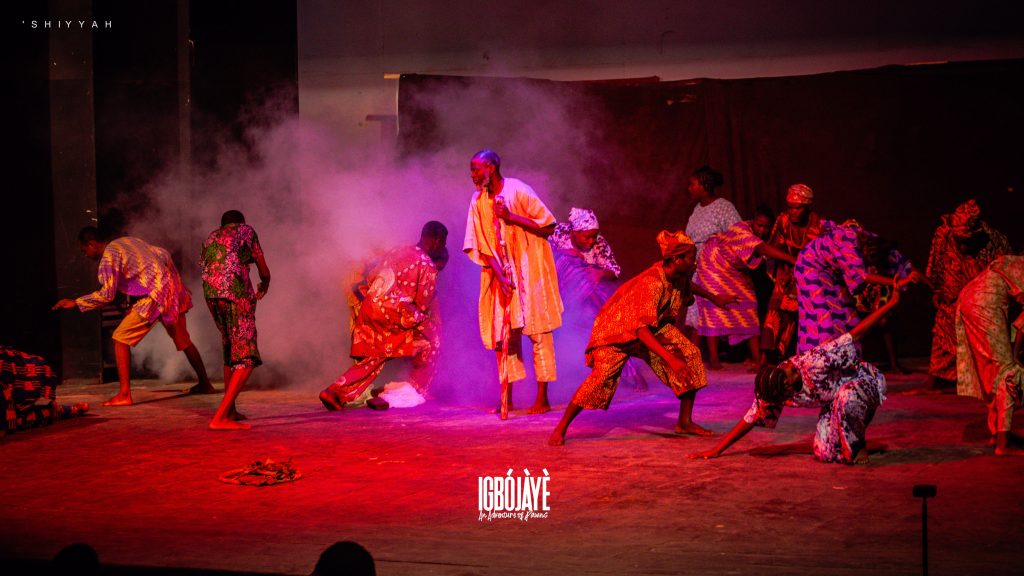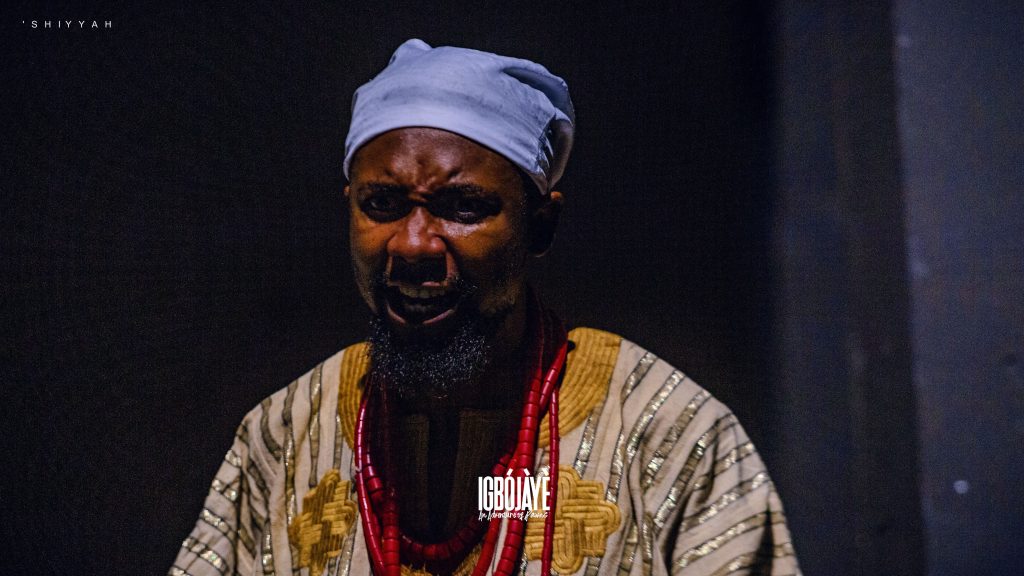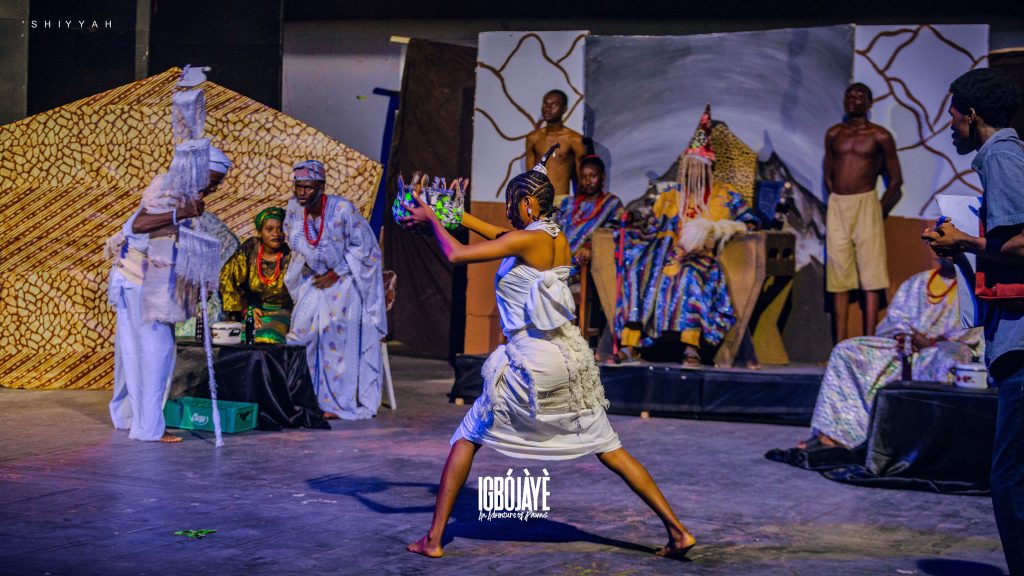By Okojie Osakwe Simeon
Theatre is serious business. Yet, within the sciences, it somehow is never regarded as anything more than a triviality. It’s commonplace on Twitter today to see Silicon Valley acolytes talk up the merits of physics and math, and in the same breath, castigate the arts and language, marking these fields out as degrees with no utility. One such instance came with the furore around one Dr Ally Louks, whose PhD thesis titled Olfactory Ethics: The Politics of Smell in Modern and Contemporary Prose drew extreme backlash from a section of the internet more devoted to tech and conservative politics. It was an inane, outlandish response to an otherwise innocuous post about completing a PhD, with Dr Louks’ work labelled as a waste of resources, and worse, a case for the expulsion of women from academia. Personal attacks, death threats and shouts of ‘Le Wokisme’ aside, it showed most critically an inability of a vast majority of people to appreciate the arts and recognise the merits in these often-underfunded fields.
Dr Louks’ dissertation, which nary an online troll bothered to read, covered an interesting subject: the proclivity of certain authors to use smell in literature to indicate social hostilities, such as prejudice and exploitation. Smell has often been used as a justification for classism, racism and sexism. Very commonplace, even within Nigeria, is the viewpoint that dreadlocks smell of marijuana or damp, or whatever comes to the mind of the debased finger-pointer. This harmful stereotype seeks to paint black people who sport these hairstyles as less than human. Today, in Nigeria yet again, women are so often dehumanised by men, tagged as having fishy-smelling vaginas. In fact, a very notable case is that of popstar, Ayra Starr, newly tagged with the ‘dirty girl’ label, a pathetic attempt by misogynists to shame her into conformity. So often, even within school settings, poorer students are tagged as foul-smelling in order to strip them of their humanity. All this is very applicable to us as a people, and Dr Louks’ coverage of such instances in literature sought to provide a greater understanding of our inherent biases and cite a learned disgust response in human beings.
But this inherent dismissal of the humanities has come to characterise Nigeria and the world at large. And the intertwining of conservative ideology with the sciences merely seeks to promote this schism, marking literature and fine arts out as ‘woke’ pursuits, seeking to promote redundancies such as AI-generated art and writing in their stead. “With the rise of this specific brand of fascism, especially in the States, we have seen a rise in anti-intellectualism,” Dr Louks tells Rolling Stone. “That affects the arts and humanities the most because those are the subjects that encourage us to think critically about the social messaging that we are surrounded by at all times. It is very much in the best interests of those in power to ensure that citizens don’t question authority. The humanities have a very significant role in combating that kind of ideology. And the kind of meticulous defunding and denigration of the humanities should be met with scepticism. Let’s make critical thinking cool again.”
Let’s make critical thinking cool again, indeed. But localising this to our setting, just how at odds are the sciences and the humanities? And how does this translate to Nigeria’s present literary and arts scene? Bamijoko Favour, in a December 2024 IndyPress article, painted a picture of an Ibadan literary scene struggling to find relevance in present-day Nigeria. Of Ibadan, a one-time beacon of the arts, with the siting of the University College within it, Nigeria’s first university, with her array of literary products from those years—Nobel Laureate, Wole Soyinka, Ken Saro Wiwa and Chinua Achebe amongst others. Without repeating many of the viewpoints of that article, with her seasoned artists and decorated thespians at the time, Ibadan, and truly, Nigeria as a whole, seems to have taken a step back from those years. Yet, within this same city, within the lecture theatres of the College of Medicine, University of Ibadan, the arts are derided as mere nugatoria, dismissed in callous jibes by lecturers as inconsequential and unchallenging, the very phrasing in which Dr Ally Louks was shut down on Twitter.
And humorous phrasing aside, this sort of rhetoric is like to imbue in young medical students, and perhaps other students of the sciences, an innate dismissal for the humanities, a viewpoint that sometimes filters into Med Twitter, with young, inexperienced students, seeing their course as the be-all and end-all of academic achievement, as infinitely more difficult than any other field of study. “Oh, how I wish I were in theatre arts, I could dye my hair and party all semester, and still bring home As.” Yet, it is an obscene tragedy that these people would seek to target other departments with freedom of expression rather than question that overbearing hand of Hippocrates, which aims to stifle them creatively. It is not as though you couldn’t do all these things in medical school, as though you could not truly rebel. It is that you do not wish to. You’re scared. And I must stress once again, theatre is serious business.
Igbojaye: An Adventure of Pawns makes a strong case for theatre and the arts in Ibadan. From a more personal viewpoint, I’ve been a fan of theatre for a long time, the Loyola Union’s 2018 performance of Wole Soyinka’s The Trials of Brother Jero leaving a profound impact on me in the years that followed. But I’ve been lax in my patronage of the arts in my years in medical school, seeing less and less, reading less and less. And, it’s a phenomenon I’ve only recently started to nip in the bud, less willing to give excuses for not living life fully. Therefore, the opportunity to see Igbojaye was too good to pass up. But I must admit, I was sceptical. In the past, following Yoruba dialogue in plays has been difficult for me as a non-native speaker, and I was to be without a translator this time, on a solo assignment. In addition, I knew next to nothing about the play or its writer, could this be underwhelming? I couldn’t have been proved any wronger.
Come Saturday, May 3rd, 2025, the ninety-minute wait before proceedings would kick off by 6:30 pm would admittedly prove exhausting, with not much by way of an apology for this disheartening disregard for time and schedules. Beyond that particular Africanism, the director, Progress Adetula, was staunch in his support for theatre culture in Ibadan. He encouraged attendees in the opening address to see more stage plays and passed along a message that this production was unrelated to the very real village of Igbojaye in Oyo State, and was purely a work of fiction.

Initial instrumentals will set the tone across the Wole Soyinka Theatre before Baba Amoye (Iyanuoluwa Ajibike) will take to the stage, enveloped by smoke. His clear diction reverberated through the teeming theatre as he took on the role of narrator, telling a tale of a prosperous land with bountiful harvests and great returns in trade. But all this will come to ruin when they forget the source of their prosperity: Orun, a pot blessed by the gods, buried in the Earth. With the people neglecting this great treasure and refusing to pay homage to their ancestors, ruin will befall them, dead livestock and withered crops making the once-prosperous town into a shadow of itself. Salvation will only come when the elders consult a diviner to reveal the source of their plight. And with a message from the gods to remember the Orun, it is resolved that a child shall be born and be the guardian of the pot till she dies. Will the people of Igbojaye be able to protect this child and this pot? Only time will tell.
The scene cuts to an art display, Professor and Mr Wilson in a heated conversation. Mr Wilson, a foreign art dealer, is in the hunt for something special, for an inspiring work of art, and nothing displayed by the Professor seems to satisfy him. The clash of Wilson’s transatlantic accent and the Professor’s colonial-era Nigerian diction is an interesting contrast, immediately garnering the attention of the audience. Wilson’s constant brushing-aside of his straight wig, along with Prof’s constant tugging of his suspenders and his acutely placed newsboy cap, all exaggerated for comedic effect, also seem to help. Prof is soon seen with some agitated undergraduates, the bone of contention being their coming research project. Initial choices have been thrown out the window with the Professor coming up with new topics for the group. Five of them, chosen by ballot, are to conduct their research in the distant Igbojaye, soon to become major players in a story they are not yet aware of.
The arrival of these five to Igbojaiye comes in the middle of a loaded meeting between the King, the Olu-Igbo of Igbojaiye and his council of chiefs. Femi, an afroed dandy with an indiscernible air about him, Mojisola, his girlfriend, the archetypal city baddie, played by Ajoba Eniola, writer and producer of this stage play, Fatimah, the devoted muslimah, punctuating all her sentences with dhikr, Azuka, an amusing tapestry of Igbo stereotypes, accent, mutton chops, love for ego and all, and Akinwale Oluwakayode, played by Odama Miracle, his unsettled speech and dated hair part marking him apart. They state their mission as 300-level Fine Art students in researching the art of Igbojaye, with Kayode expressing a specific intention to study the ancestral pot. While they are barred from approaching the pot due to its spiritual significance, the students are still welcomed by the evidently progressive Olu-Igbo to research other aspects of Igbojaye culture under the supervision of Baba Amoye.

Addressing the students later on, Olu-Igbo Tadenikawo played by Toluwaleke Owonifaari, a star in Mammy Water’s Wedding, previously covered by UIMSA Press, would deliver a moving monologue. “Students. What you seek to understand in Igbojaye isn’t just words in a book or photos. It is a living, breathing history.” His continued dialogue with them reveals the approach one must take in studying cultures—rather than see these people merely as a whole, as a monolithic tenet to absorb and summarise within words on paper, or mere statistics as our brethren in the sciences are wont to, we must recognise the uniqueness of each person and each story within context, and view culture as an ever-dynamic host of lived experiences and realities. And only through truly appreciating humanity and showing reverence for these people can we come to see things from their viewpoint. Owonifaari’s moving delivery and strong command of body language would mark him out as a highlight of the play as time wore on.

At the Orun festival, so-named after the pot which it celebrates, the Olayinto dance troupe would deliver an energetic performance to the tune of Flavour’s Nwa Baby, albeit with reworked vocals, the audience left spellbound by the performance as a whole. And in time, the Olu-Awo, chief diviner and second in command only to the Olu-Igbo, is on hand to usher in the Orun. It arrives, borne by the white-clad Ajiun, dancing maniacally, fluorescent lights emanating from the pot to great theatrical effect. Her flight across the stage is a remarkable display of skill and agility, and soon she is gone, just as quickly as she came, the audience hooting and hollering now.
“Ooo, Olu-Awo ti de. Ase, ase, Olu-Awo gbadura fun wo. Ase.” It is time now for the Olu-Awo to cast the Opon Ifa to reveal the path going forward, an ominous prophecy spelt out by the great diviner. Shadows loom over the land, arising not from maliciousness but from ignorance. These forces are working to bring down the trees of the land, and Ifa reveals that strangers in the land must be guided by the king. It is in direct reference to the university students, just as confused as everyone else at the diviner’s utterances. In addition, the revelation emphasises that all residents of Igbojaye must remain celibate for the next five days, an announcement that elicits palpable aggravation. “Olu-Awo, shey ati Kabiyesi naa?” Yes, Mr Kabiyesi. Nothing for you.
Following the Too Hot to Handle declaration, the research students are seen in the shrine of their supervisor, Baba Amoye, the old blind man, reminiscing fondly on his youth. His ward, the equally visually impaired Ajiun, played by the enigmatic Deborah Abantelhe, stumbles into the room before spilling a drink on an enraged Femi. Soon, Baba Amoye and the other students are gone, leaving only Ajiun and a smitten Kayode in the shrine, from whence an unlikely romance begins to blossom. The suave city boy is soon weaving together lines of poetry in his iconic stutter, Ajiun meanwhile adamant that he abandon the riddles and come clean with her. And with every urging, he sheds a bit of the mystery in his words until he finally tells her clearly that he’s loved her since he’d seen her at the dance and wants to be with her. The feeling is mutual.
However, the air of romance is soon replaced by a conspiratorial one, Femi seen hatching plans with the students to steal Orun and sell it to a hidden collector for top dollar. Kayode, the only one against this idea, storms away from the gathering. Femi, Azuka and Mojisola are undeterred by this reaction, though, and armed with liquid courage, swigs of Azuka’s potent kaikai urging them on, they make good on these plans with Femi retrieving the pot from the shrine in Kayode’s absence. Alone in the shrine and unable to see, Ajiun is left confused by the noises around her, and before parting, Femi would do the unthinkable and rape the young priestess, also in direct violation of the Olu-Awo’s declaration. This low point raises the age-old question of the use of sexual violence as a plot device. At what instances is it truly necessary to rely on this sort of material, and how can we navigate this in storytelling without playing into potentially offensive ‘defiled damsel and vengeful saviour’ tropes?
The next scene reveals a governing council in disarray. With news reaching the chiefs that the pot has been stolen, Ajiun is unconscious, and Baba Amoye is dead, the Olu-Igbo is a picture of sorrow, barking ruefully at no one in particular.
The Olu-Awo is unperturbed; the gods have revealed to him that the perpetrators of this calamity will pay in blood, with Ajiun’s spirit set to do her vengeful bidding. With Azuka already missing, the remaining four students are already apprehensive. And these fears are instantly validated when a horde of primal, skittering creatures ambush the group. While the others escape, Fatimah is frozen to the spot in fear, her prayers unable to save her from being eaten by the beasts. Mojisola is next to go, ambushed later when she comes upon Fatimah’s remains.
Femi and Kayode eventually happen upon the Professor and his caucasian guest, Mr Wilson, just as they are newly appraising their latest acquisition, Orun. The students are in disbelief at this revelation, shocked to learn that their Professor was the collector who set up this series of events just to get his hands on the sacred pot, which he viewed as high art. The academic left them in shock as he explained his scheme and their role as pawns. Femi and Kayode however, insist on the return of the pot in order to save their own skin, highlighting its significance to the Igbojaye people. At this point, Prof puts his hands in the pot, keen to get a feel of this power they talk about, and is almost immediately struck by an unseen apparition, after which he collapses dead. Wilson hightails it out of there, and the young men rush back to Igbojaye with the rescued pot.
The deaths were not over, with Femi collapsing in the throne room, clutching his chest, smitten by the gods for his role in the catastrophe. The delirious Kayode is swamped with despair in the absence of his lover and now, all of his friends, and grabs a knife from the belt of a nearby guard before stabbing himself in his abdomen. It is a gutting (pun intended) end to a thrilling story, as a now-recovered Ajiun rushes into the throne room just a moment too late. The Olu-Igbo is firm now in his conviction, regarding Kayode not as a hero but as a message, much to the chagrin of Ajiun. It is a revelation of what happens when a people ignore warnings, in his words, a strong reminder to adhere to the will of the gods.
And Azuka’s fate? He managed to escape to his village with the money, of course. That shop in Aba isn’t going to set itself up.
In conversation with the press, Progress Adetula, director of Igbojaye is earnest. Igbojaye to him, is an expression of the need for Africans to preserve their culture and in addition, their resources. He sees the play as he sees life: through the lens of cause and effect, a philoophy that extends even to his views on the environment. “Whatever you sew, you shall reap,” he muses, and given the fates of the Professor and his students, we can only nod in agreement. The filmmaker is also keen to reveal the secrets of making this play, emphasising the use of aesthetics and effects in bringing this story to life, full of appreciation for a strong cast that helped bring it all to fruition.
On theatre in Ibadan, he admits to Lagos still being ahead of Ibadan as far as theatre is concerned, but he is optimistic for the future, keen to see the returns from newer production companies, including Ajoba Productions, which handled Igbojaye. The spaces are also important in this vision: Wole Soyinka Theatre and New Culture Studio being longtime stalwarts in the city. Adetula recognises that at a point, theatre culture indeed died in Ibadan, and it’s only recently started to recover. There is a definite need for more funding and collaboration in his words, and grants to this effect will help those involved to produce more plays and grow theatre culture, as there is definite interest from the fans these days, given that he has had three sold-out plays of the seven he’s directed.
It’s clear as day. From his genuineness when speaking on stage plays to his strong conviction in this growing arts scene in Ibadan—theatre is serious business, and it’s time we recognised it as so.

